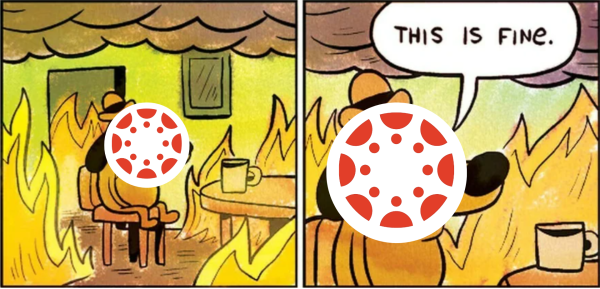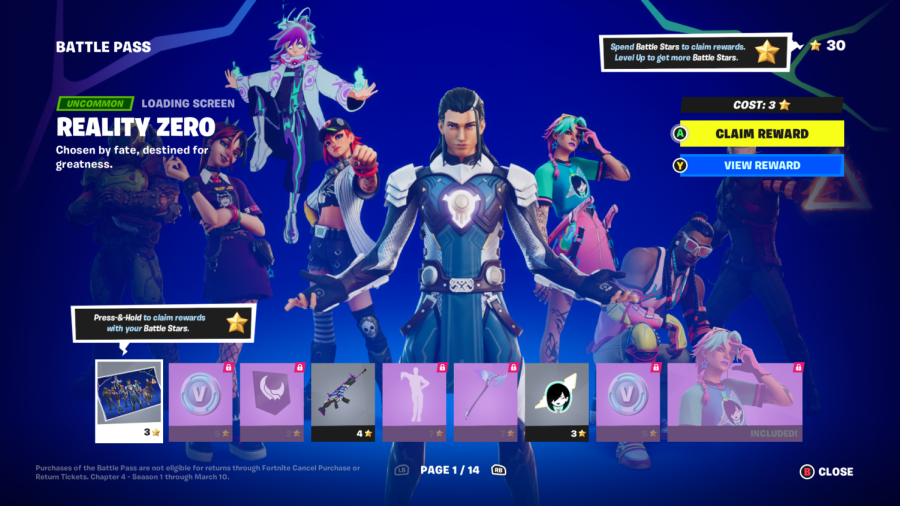How the Battle Pass Destroyed Gaming
A screenshot of the most recent Fortnite Battle Pass, a paid rewards system. Photo credit to Epic Games, used under Fair Use.
As a kid, everyone could not wait to come home and hop on their game console and play for the rest of the night with their friends in whatever multiplayer shooter, indie game, or zombie survival game they found. Fast forward to 2023, and people are not playing games as frequently as they once were. Gaming is not as exciting as it used to be because a lot of games have the same format, which includes a battle pass. We can only blame one game for that: Fortnite.
Fortnite popularized the concept of battle royales and battle passes, but the idea originally came from a game called Dota 2. The battle pass in Dota 2 was $10, and out of each one purchased, $2.50 went to a prize pool. This idea was a success and eventually began to spread to other games, such as Team Fortress 2 and Fortnite, which led to the concepts of free-to-play and battle passes gaining more traction. Fortnite was a hit because it was one of the first battle royale games to be added to every platform. It also implemented a building mechanic that allows players to protect themselves when challenging someone else.
Yes, the existence of free-to-play modes and battle passes in Fortnite can be considered positive, but the idea has caused many games to lose their uniqueness. A good example of this is Call of Duty: Black Ops 4. This game was expected to be a huge release, like the rest of the Black Ops series, but it wasn’t. The developers added a battle royale mode titled “Black Out,” which was enjoyed by many but revealed a lack of creativity.
Call of Duty is far from the only game to copy Fortnite’s battle passes and battle royales in an attempt to cash in. Video game companies have taken the battle pass idea from Fortnite and implemented it into every game they can. For example, NBA 2K and Madden. This can be beneficial since it gives players a way to earn rewards for free and keep themselves up-to-date within the game. However, the eagerness to include battle passes in every game has stunted creativity.
Fortnite has had a number of negative effects on video games. One that is constantly overlooked is Fortnite’s addition of cosmetic skins that are not necessary to gameplay. The majority of people who played Fortnite religiously were tempted to spend money to have the nicest skins. After seeing the success of Fortnite’s money grab, many other companies decided to add cosmetic skins to their games.
A great example is Activision, which has added skins to Call of Duty. In early Call of Duty games, there were not many operators to choose from. They were basic and did not have much meaning. Players were also able to grind for camos, which made the game entertaining and allowed the game to keep its value over time.
Now, players are able to buy skins for their guns and a new operator every week when the item shop refreshes. This has caused Call of Duty to become more like a fashion show than an action-packed multiplayer shooter. What happened to the intense competition between each game and the fear that an upcoming release would not be worth playing? Over time, this has become a major problem in the gaming community, and it has not been acknowledged enough.
Although we are in a different era where the inclusion of battle passes has become more common and accepted, battle passes take away the love of gaming for the gamers who are truly passionate—the ones who can be found gaming with their friends every night.








Alexander Long • Apr 9, 2024 at 5:05 pm
As a game design major, and someone who’s written a few research papers on similar topics, this article is very poorly written. Aside from the blatant typos and lack of credible sources, this argument completely lacks any sort of cohesion, as irrelevant information is constantly brought up. The generalized “downfall” of the gaming industry as a whole is not solely due to the widespread adoption of battle passes after Fortnite popularized them. This downfall is a result of a variety of different factors such as the industry now shifting towards live service games, and many triple-A publishers firing their best developers, in an effort to make more money. While the triple-A industry is on a major decline, the double-A and indie scene is also experiencing a massive amount of growth, and the gaming industry is in a better spot now than it’s ever been. Fortnite may have popularized the battle pass, but it was well implemented into the game and well received by most players. Fortnite is not at fault here, it’s the fault of other game companies for attempting to adapt a battle pass format into game genres where they inherently don’t belong. Also, Fortnite’s monetization model of cosmetics was a positive for the game, as it allowed all players to enjoy the game on an even playing field, without the need to spend money for better weapons. The argument here seems to be that monetized cosmetics are bad, however, games need to make money, in order to maintain funding. I’m not really the biggest fan of Fortnite either, but pinning all the blame on it for the issues in the industry seems to be missing the bigger picture here. Publishing articles without thorough research more or less defeats the point of journalism, I’d suggest interviewing those with more knowledge in the field, rather than going off of gut instincts on a topic you aren’t familiar with.
Justice Menzel • Apr 23, 2024 at 1:38 pm
This article has been marked opinion. Any typos have been re-edited for clarity. Thank you for your response.